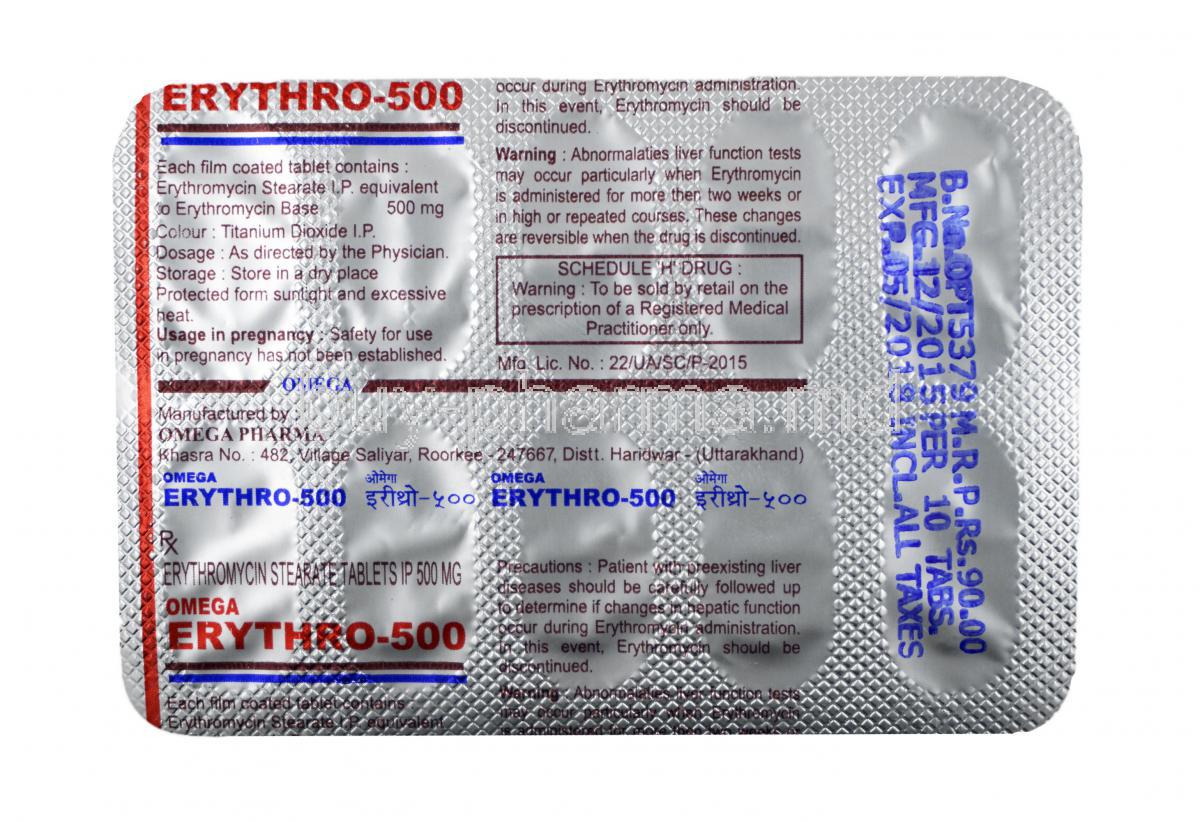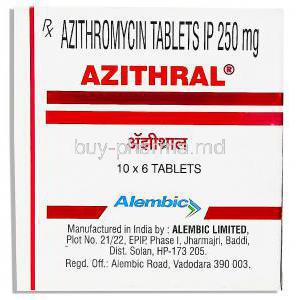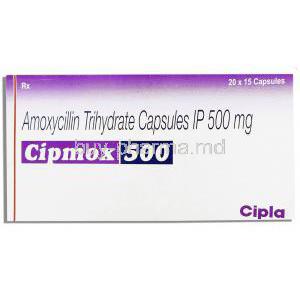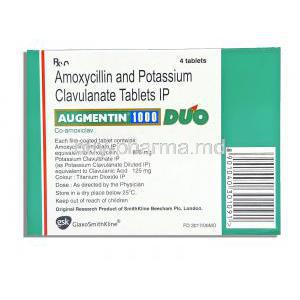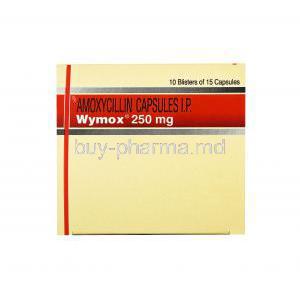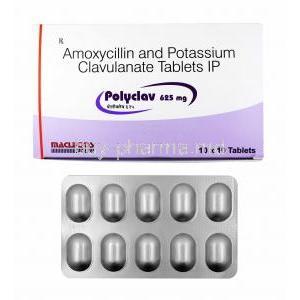Erythro, Erythromycin
- Introduction to Erythromycin
- Uses of Erythromycin
- Off-Label Uses of Erythromycin
- Dosage and Administration of Erythromycin
- Erythromycin: Side Effects and Management
- Interactions of Erythromycin with Other Medications
- Important Precautions While Using Erythromycin
- Special Considerations in Erythromycin Administration
- Guidelines on Storage and Handling of Erythromycin
- Dealing with Overdosage of Erythromycin
- Contraindications of Erythromycin
- Careful Administration of Erythromycin
- Conclusion: The Role of Erythromycin in Modern Medicine
Introduction to Erythromycin
Erythromycin, a standing and trusted weapon in our fight against bacterial infections, demonstrates human innovation's brilliance. This medicine's continued importance in medical practice showcases the harmonious blending of scientific breakthroughs and practical treatment strategies.
Historical Background of Erythromycin
The journey of erythromycin started in the 1950s, a time when antibiotic research was flourishing. It was accidentally found in the soil bacterium Streptomyces erythreus and its discovery brought about a chapter in combating bacterial strains that were resistant, to penicillin. This breakthrough not only broadened the scope of antimicrobial treatment but also highlighted the unexplored possibilities of finding drugs from natural sources.
Overview of Its Medical Relevance
- Erythromycin is effective against a range of Gram-positive and certain Gram-negative bacteria making it a valuable resource for healthcare professionals.

Gram-Positive and Gram-Negative Bacteria
- It plays a role in treating respiratory tract infections, skin ailments, and sexually transmitted diseases showcasing its diverse applications in clinical practice.

Respiratory Tract Infections
- Additionally, it is widely used as a measure during surgical procedures and for individuals with allergies to penicillin further highlighting its importance, in therapeutic settings.
Composition of Erythromycin
Erythromycin possesses a structure that exhibits a complex macrocyclic arrangement, which is a distinctive feature of antibiotics belonging to the macrolide class. This intricate configuration plays a role, in determining its mode of action and pharmacological characteristics.
Active Ingredients and Their Functions
- The main factor that makes erythromycin effective, in stopping growth is its active component, a ring made of macrolide lactone. This component works by blocking protein synthesis in cells.
- To make it more effective erythromycin contains desosamine and cladinose sugars that improve its ability to dissolve and penetrate tissues.
Formulation Variants and Differences
Erythromycin displays its versatility through the availability of forms, such, as oral tablets, topical creams and intravenous solutions. These formulations are designed to optimize treatment effectiveness and ensure patients can easily follow the regimen while minimizing any potential side effects.
Understanding How Erythromycin Works
Erythromycin's pharmacodynamics rely on its ability to hinder the growth of bacteria. It achieves this by attaching itself to the 50S subunit, which disrupts the synthesis of proteins. A crucial process, for bacterial replication and growth.
Mechanism of Action in Bacterial Infections
Its bacteriostatic effect primarily focuses on blocking the translocation process leading to the halt of adding amino acids to newly forming protein chains. This mechanism is especially potent, in combating a range of disease-causing bacteria thus reducing their ability to cause harm and slow down their spread.
Comparative Analysis with Other Antibiotics
When comparing erythromycin to antibiotics it has a distinct role in therapy. While drugs like penicillin and cephalosporins work by affecting cell wall synthesis erythromycin specifically targets bacterial protein synthesis.
This difference is not a biochemical one but also has significant implications in clinical situations particularly when treating infections caused by bacteria that are resistant, to other types of antibiotics.
Uses of Erythromycin
Erythromycin, an antibiotic belonging to the macrolide family holds a significant place in the field of medical treatment. Its ability to effectively combat a range of infections is due to its unique mechanism of inhibiting bacterial protein synthesis. In the below sections, we will explore the numerous ways in which erythromycin is utilized for treating different health conditions.
Primary Indications in Medical Treatment
- Erythromycin is commonly employed as a first-line treatment for infections, particularly in patients who have a penicillin allergy.
- Its ability to combat an array of Gram-positive and certain Gram-negative bacteria makes it highly effective.(2)
- It plays a role as an alternative option for managing bacterial infections, in individuals who cannot tolerate other types of antibiotics.(3)
1. NCBI - Erythromycin
2. PubMed - Microbiological aspects of erythromycin
3. ScienceDIrect - Erythromycin
Erythromycin in Treating Respiratory Infections
Erythromycin has proven to be highly effective in treating infections.(2) It is especially helpful in fighting illnesses such as pneumonia, bronchitis, and whooping cough(2). This antibiotic is preferred in cases due, to its ability to reach the lung tissue providing relief and promoting speedy recovery.
1. National Library of Medicine - Erythromycin in the treatment of streptococcal infections
2. MedlinePlus - Erythromycin
Role in Treating Skin and Soft Tissue Infections
Erythromycin is known for its ability to treat skin and soft tissue infections. It has been extensively proven effective in addressing conditions, like acne, impetigo, and cellulitis. By inhibiting growth, this medication helps alleviate symptoms and halt the spread of infection.
Usage in Gastrointestinal Disorders
Apart from its uses erythromycin is also beneficial in gastrointestinal conditions. Its ability to promote the movement of the tract, known as prokinetic action proves helpful in cases such, as gastroparesis. This unconventional application highlights the therapeutic possibilities of erythromycin.
Application in Eye Infections
The antibiotic is also effective in treating eye infections in newborns to prevent ophthalmia neonatorum caused by Chlamydia trachomatis and Neisseria gonorrhoeae. Its use in eye medications further demonstrates its range of therapeutic benefits and highlights its essential role, in modern medicine.
Off-Label Uses of Erythromycin
Erythromycin, a regarded antibiotic known for its effectiveness against bacterial infections has now found a place in unconventional treatment methods. This powerful macrolide antibiotic, with its ability to inhibit growth, goes beyond its traditional usage and showcases adaptability, in various clinical situations.
Unconventional Treatment Approaches
Erythromycin has been studied as a way to improve the movement of the system in gastrointestinal disorders.
- Its usefulness in speeding up stomach emptying in conditions like diabetic gastroparesis shows that it can do more than fight infections.
- In the field of dermatology, erythromycin is commonly used to treat acne not only because it kills bacteria but also because it reduces inflammation.
- Its use in inflammatory conditions like rosacea demonstrates its ability to have multiple therapeutic benefits.
Exploring Erythromycin in Non-Bacterial Infections
The use of erythromycin in treating bacterial infections demonstrates its diverse range of pharmacological effects. Research has investigated its ability to modulate the system, which could be advantageous in viral infections caused by specific respiratory viruses.
Although this off-label application is not widely accepted yet it emphasizes the exploration of expanding the treatment options for established medications, like erythromycin.
Dosage and Administration of Erythromycin
The effectiveness of erythromycin, which is a commonly prescribed macrolide antibiotic depends on following the recommended dosage and administration practices. These guidelines are designed to optimize the benefits while minimizing any potential negative side effects.
Standard Dosage Guidelines
- The typical dose of erythromycin is usually between 250 to 500 mg every 6 to 12 hours depending on the seriousness and kind of infection.
- In severe cases, the dosage might be increased so it's important to have medical supervision, for such adjustments.
- The length of treatment usually lasts from 7 to 14 days ensuring that the infectious agent is completely eliminated.
Adjustments for Specific Patient Groups
It is crucial to make changes to the dosage for specific patient groups in order to avoid any potentially harmful effects and guarantee effectiveness. Patients with kidney or liver problems often need a dose. When it comes to children and older adults it is important to determine the appropriate dosage based on their unique physiological characteristics and varying tolerance, towards the medication.
Administration Techniques and Best Practices
To improve the absorption of erythromycin it is advisable to take it with a glass of water. It is generally recommended to take this medication on a empty stomach but if you experience any discomfort, in your stomach you can take it with food. It is important to follow the prescribed schedule to avoid the development of antibiotic resistance.
Erythromycin: Side Effects and Management
Though erythromycin is usually well tolerated it does come with some side effects. Being aware of and actively managing these reactions is important, for ensuring effective treatment.
Common Side Effects and Their Frequencies
Gastrointestinal issues like feeling nauseous, vomiting, and experiencing diarrhea are frequently observed as side effects affecting a number of patients.
There might be allergic responses such as developing a rash or itching which require careful monitoring and possible intervention.
Even though it is uncommon there is still some concern about liver damage, in cases of term or high-dose treatment.
Managing Mild to Moderate Side Effects
Mild to moderate side effects typically improve with treatment to alleviate symptoms or adjust the dosage. Making changes to your diet and incorporating probiotics can be helpful for issues.
Allergic reactions can be managed by using antihistamines. It is important to consult with healthcare professionals and closely monitor any side effects, for proper management.
Identifying and Responding to Severe Adverse Reactions
Severe adverse reactions such as anaphylaxis, jaundice, or severe skin reactions require medical attention. It is crucial to discontinue the use of the medication and seek medical intervention, in these situations to prevent any serious complications.
Interactions of Erythromycin with Other Medications
Erythromycin, similar, to other medications has the ability to interact with different drugs, which may change how well it works and raise the chance of experiencing negative effects.
Common Drug Interactions and Risks
- Using drugs like warfarin, theophylline, and carbamazepine at the time can cause higher levels of these medications in your blood, which can be harmful.
- When erythromycin is taken together with statins it raises the chance of experiencing muscle problems and a condition called rhabdomyolysis.
- Therefore it's important to be careful when using them together. If erythromycin is combined with antibiotics like clindamycin it may reduce the effectiveness of the treatment due, to conflicting effects.
How to Avoid Potential Drug Interactions
In order to prevent drug interactions it is extremely important to give healthcare providers a comprehensive list of all the medications you are currently taking. It is crucial to monitor your drug levels and clinical symptoms and make necessary adjustments in your treatment plan as required. These strategies are essential, for minimizing the risks associated with significant drug interactions.
Important Precautions While Using Erythromycin
When using erythromycin, a prescribed antibiotic it is important to take certain precautions into account to ensure safety and effectiveness. Being aware of any existing conditions, lifestyle factors and the specific needs of different populations is essential, for maximizing its benefits.
Pre-existing Conditions and Erythromycin Use
- People who have had liver disease in the past should be careful when using erythromycin since it is processed by the liver and could worsen conditions.
- It is important to monitor patients with known heart problems, especially those, with rhythm disturbances because erythromycin can potentially cause QT prolongation.
- If someone has kidney problems their dosage of erythromycin should be adjusted to avoid buildup and potential toxicity.
Lifestyle and Dietary Considerations
The way you live and the food you eat can impact how well erythromycin works. It is recommended to limit alcohol intake since it can raise the chances of liver problems. Its also advised to have a diet and avoid consuming too much grapefruit juice as it can affect how erythromycin is processed in your body.
Special Considerations in Erythromycin Administration
Special considerations must be taken when prescribing erythromycin to groups of individuals such, as the elderly, pregnant or nursing women, and children in order to guarantee their safety and maximize the effectiveness of the treatment.
For Elderly Patients: Adjustments and Cautions
In patients, it may be necessary to adjust the dosage of medications due, to decreased liver and kidney function. It is crucial to monitor for any potential side effects, especially those related to the digestive system and liver as this age group tends to be more vulnerable.
In Pregnant Women and Nursing Mothers: Safety and Recommendations
Erythromycin is typically regarded as an option for pregnant women and those who are breastfeeding. However, it should be utilized with caution and under the guidance of a healthcare professional taking into account the benefits and risks, to the unborn baby or nursing infant.
Pediatric Use: Dosage and Safety in Children
When dealing with children it's important to calculate the dosage taking into account their body weight and the severity of the infection. Using formulations is often favored as it allows for more accurate dosing and makes it easier to administer medication to this age group.
Guidelines on Storage and Handling of Erythromycin
It is crucial to store and handle erythromycin properly to preserve its effectiveness and potency. Following guidelines is important to ensure that the medication maintains its efficacy throughout its shelf life.
Proper Storage Conditions
- Erythromycin should be stored at room temperature away from any exposure, to light or moisture in order to prevent any degradation.
- It is important to keep the tablets in their packaging until they are ready to be used as this helps ensure their stability.
Handling Precautions to Ensure Potency
Erythromycin, especially when it's in form needs to be handled cautiously. It's essential to give the bottle a shake before using it to make sure the concentration is even. It is crucial to avoid any contamination while handling it, especially when using droppers or syringes, for administering the medication.
Dealing with Overdosage of Erythromycin
Accidental excessive use of erythromycin is not very common. It's important to quickly identify and address it to minimize any potential negative impacts. It's crucial for both healthcare professionals and patients to be aware of the symptoms and appropriate medical steps that should be taken in cases.
Recognizing Symptoms of Overdose
Signs of taking much erythromycin can cause severe gastrointestinal discomfort, including feelings of nausea, vomiting, and abdominal pain. Experiencing symptoms like dizziness, confusion, and even possible hearing impairment may also suggest that an excessive dose has been taken. It is crucial to be aware that overdosing on erythromycin can lead to issues such, as QT prolongation and irregular heart rhythms, which should be taken seriously

Nausea
Immediate Steps and Medical Interventions
If someone overdoses it's crucial to seek help right away. The first steps involve stopping the drug and managing any symptoms. To prevent the drug from being absorbed doctors may use gastric lavage or activated charcoal. It's important to monitor heart and liver function while also providing supportive care in severe cases.
Contraindications of Erythromycin
Erythromycin is effective, for a range of people but there are certain situations and populations where it should not be used. It is crucial to identify these scenarios in order to avoid any effects or complications.
Situations Where Erythromycin Should Not Be Used
- Erythromycin should not be used by patients who are known to have hypersensitivity to macrolide antibiotics.
- People, with existing liver disease or abnormal liver function tests, should avoid taking erythromycin because it can potentially harm the liver.
- Additionally, it is not recommended to use erythromycin with certain medications that are known to cause QT prolongation or those that compete for hepatic metabolism.
Understanding the Risks in Vulnerable Populations
- Extra care should be taken in populations, such as older individuals with potential liver or kidney issues as well as those with heart conditions due to the risk of arrhythmias.
- If pregnant or nursing it is advisable to use erythromycin when absolutely necessary and, under the close supervision of a medical professional.

Pregnant Woman
Careful Administration of Erythromycin
When prescribing erythromycin it is important to customize the treatment based on the requirements of each patient. This involves considering factors such as the nature of the infection the overall health of the patient and any possible interactions, with medications.
Tailoring Treatment to Individual Patient Needs
When it comes to personalizing erythromycin treatment there are factors to take into account. These include age, weight, renal and liver function. Additionally, the severity and type of infection should be considered in order to determine the appropriate and safe treatment plan.
Monitoring and Follow-up Strategies
It is crucial to monitor the effectiveness of the treatment and any potential side effects. Follow-up plans should involve checking liver function and in some situations monitoring health. Educating patients about the importance of following prescribed dosing schedules and recognizing any effects is vital, for successful treatment.
Conclusion: The Role of Erythromycin in Modern Medicine
Erythromycin continues to play a role in the field of modern medicine, especially as a versatile antibiotic option for individuals, with penicillin allergies.
Summarizing Key Points
Erythromycin is an antibiotic that can effectively treat a range of infections. However, it is important to use it by considering the appropriate dosages, potential side effects, and any contraindications.
Future Prospects and Ongoing Research in Erythromycin Use
Ongoing studies and advancements are constantly exploring novel uses and compositions of erythromycin which may broaden its effectiveness in treatments down the line. The progress of erythromycin application, driven by research and practical experience will play a significant role in shaping its contribution, to healthcare.

